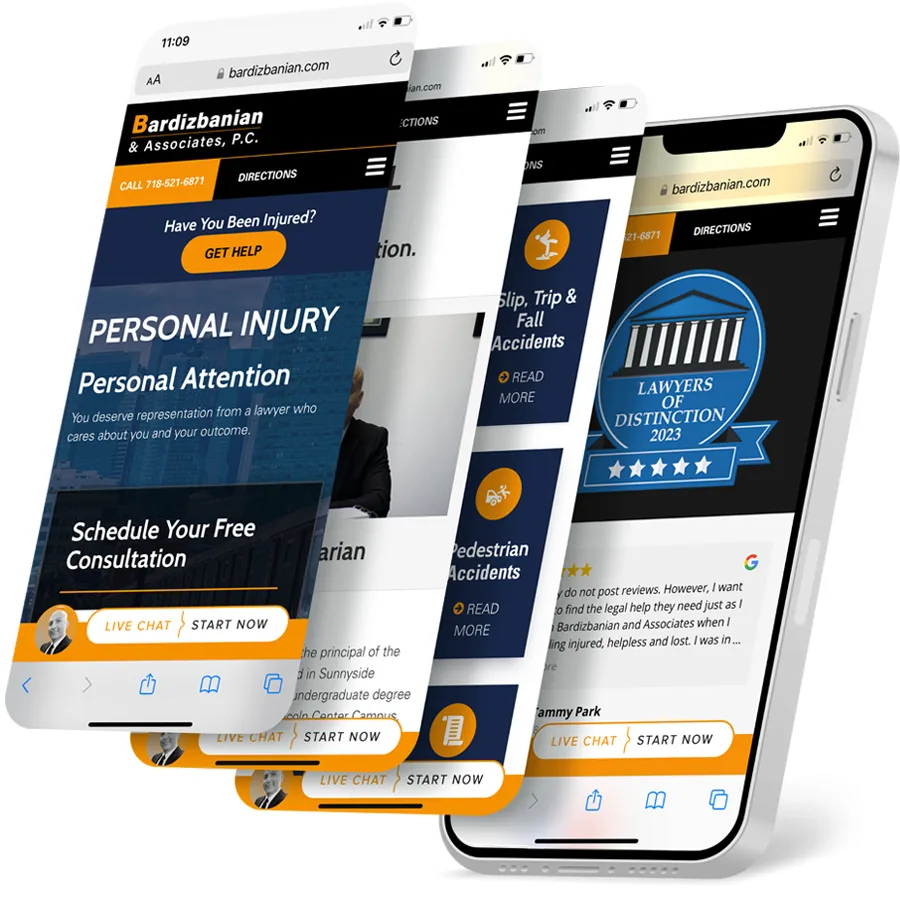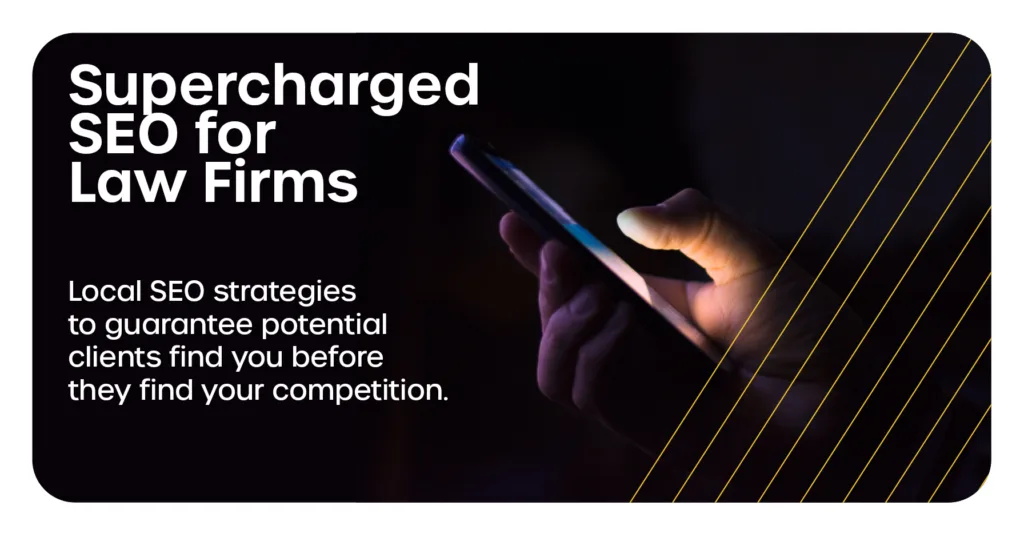Mistakes in your SEO strategies and tactics can be costly for your law firm, resulting in low search rankings or removal from search engines.
Most of your website’s traffic comes from organic searches. That means that an effective SEO strategy is more important than ever. Yet SEO is a complex web of strategies, technical aspects, and the ever-evolving search algorithms themselves. It’s easy to make mistakes, and any mistake will cost you business.
In a broad sense, SEO errors come in two varieties. SEO Strategies are the way you think about SEO and what you do, free of the nuts and bolts of programming. Technical SEO involves the coding of your sites. Technical SEO is mostly or even entirely invisible to users, but it’s no less important for the overall SEO field.
SEO Strategies to Avoid
Underestimating Cost
Don’t get us wrong, cost is important. You want your SEO strategy to work within your budget, and as a law firm, your budget can be tight. The issue is that most of the SEO grifts out there prey on this very worry. They promise fast results for rock-bottom prices. At best, you’re flushing money down the toilet. At worst, they can actively harm your SEO.
While no one likes spending money, the fact of the matter is, you get what you pay for. Set money aside for content-generation, site updates, someone to manage your social media, and so forth. Any reputable digital marketing provider will have an itemized list. It costs a bit more, but your SEO will be built the right way.
Underestimating Time
This goes hand-in-hand with the first point. Many of the places offering low prices also promise quick results. They might as well; one more empty promise isn’t going to change things. Fundamentally, asking for quick SEO results misunderstands what SEO is, how it’s achieved, and the realities of the digital landscape.

Building a strong portfolio of website content and backlinks is a long-term investment that can pay huge dividends down the line.
Search engines want sites that have a consistent track record of content production and quality. This literally cannot happen overnight. They also prioritize sites with frequent and regular updates, as well as libraries of backlinks demonstrating that said site is part of a larger community. That said, it takes four months minimum for SEO to produce significant results. Have patience with your strategy and you will be rewarded.
Copying Competitors
You should be aware of what other law firms in your area (both geographic and practice) are doing. Keyword research, backlinks, and what sorts of content they post are all valuable. The problem arises when you move from understanding and adjusting your strategy to outright mimicry.
You can miss the big picture, whether from flawed information or copying a strategy that is on the cusp of being slapped down by Google. There is also the real danger of search engines prioritizing the original. After all, search engines like original content and mere copies aren’t going to win those rankings.
Using Black/Gray Hat Tactics
The color of one’s hat, Google-y speaking, refers to the legality of their tactics. Black Hat tactics are outright against the rules, while Gray Hat tactics push the limits of what is allowed in a bad-faith manner.

If your SEO partner or team use tactics such as keyword stuffing or purchasing outside links, your website could be penalized with removal from search engines.
The most commonly abused aspects include plagiarized content, keyword stuffing, and link networks. While these can be tempting, Google’s entire business model depends on them catching and penalizing those who use them. Google is extremely good at this.
Focusing on Search Engines over Quality Content
While SEO is about communicating with search engines, never lose sight of the fact that search engines exist to provide for humans. Thus, even something optimized perfectly for the algorithm might not be rewarded if it’s complete gibberish to human eyes.
As a law firm, you have a unique advantage in the content generation business: access to specialized knowledge that a wide audience finds interesting. Leaning into this by producing content that is interesting, informative, and entertaining will serve you well. You’ll be optimizing for a human audience, which search engines are built to recognize and reward.
SEO Tactics to Avoid
Neglecting Mobile Optimization
The bulk of all internet use is now done on mobile devices. Google reacted to this trend in July 2019, prioritizing sites optimized for mobile in search results. In other words, whether your site is mobile optimized has a direct effect on SEO. Still, many firms ignore this important aspect, meaning there’s daylight for an enterprising firm like yours to exploit.
A mobile-optimized site loads quickly and accurately on mobile devices, displays a version of the site that looks good specifically on smartphones with nothing important that needs scrolling to see or strangely sized images. A responsive design, that detects what kind of device a user is on and loads the correct version of your site is the solution that helps SEO and user experience.

Not Updating Content
Search engines want sites that are relevant. This means sites that are updated consistently. Search engines know when a site hasn’t been updated recently, and as your site goes longer without an update, the more it will slip in search results.
Look at this as an advantage. Laws change all the time, and as an expert, you have the unique position of updating your client base whenever this happens while adding the additional context of how this applies to them. Staying on top of changes will not only help your SEO but will draw in a client base that looks to you as a trusted authority.
Slow Website
No one likes slow websites. If your site takes longer than 3 seconds to load, most of your traffic will abandon you for greener pastures. Because this behavior is so consistent, Google and other search engines have taken the next obvious step and simply factored in loading times to determine search rankings.
Keep that 3-second barrier in mind with every update and test your load speed frequently. If your speed drops below that killer line, look into cleaning house by eliminating slow-loading elements.

Keeping your website loading speeds fast on all devices will keep more visitors from leaving and you’ll also be rewarded with higher search rankings.
Not Optimizing Headings/Meta Descriptions
Headings and meta-descriptions are important tools that essentially help search engines understand what is on your page. Using these (and other factors) they can more effectively match your page with relevant queries.
The best way to optimize is by seeding your keywords through your headings and meta descriptions. Matching these reassures the search engine that what’s on the page is what it says and will boost your rank. Ignoring this step or applying it haphazardly will penalize you.
Long Metadata
Metadata includes the meta descriptions mentioned above as well as the meta title. The meta title appears as the text of your link, while the meta description informs the user of what they’ll find on a page.
Keeping the description brief is imperative. Think of the last time you Googled something. Chances are you didn’t read very far into the descriptions of the sites you found. You scrolled until you found a good option and clicked on it. Your meta title should be no more than 60 characters and your meta descriptions should be in the 80-155 character range.
No Alt Tags on Images
While metadata helps a search engine understand what’s on your site, alt tags on images do the same for images. A human user can look at a picture of a law book and understand what it is, but if you’ve ever taken one of those “prove you aren’t a bot” tests on a website, you know they can’t.
An alt tag states clearly what is depicted in an image and provides much-needed context that gives a search engine a complete idea of what it’s looking at. Sites with alt tags do better in search rankings than those without.
Additionally, alt tags are a critical component of making your website accessible for disabled users, as screen-readers use alt text to help describe website images.

Download our free guide: Supercharged SEO for Law Firms for in-depth tips and strategies on how to make sure your website shows up at the top of local searches.
Start Your SEO Journey With Lead Science
SEO is a complicated web of relationships between visible and invisible factors; you can do well if you avoid the most common pitfalls. These best practices form a strong base to begin your SEO journey and can give you a huge advantage over those who ignore them.
At Lead Science, we use these strategies and many more to craft an effective SEO strategy our clients love. Schedule your Lead Science Discovery Call today. You’ll see how we can keep you on top of the search rankings and the organic traffic flowing.







